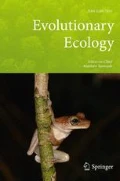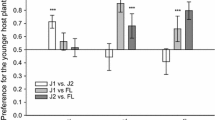Abstract
Colonization of new environments can lead to rapid changes in fitness-related traits. For herbivorous insects, switching to a new host plant can be comparable to invading a new habitat. Behavioral, physiological, and life-history traits commonly vary among insect populations associated with different plants, but how host shifts cause trait divergence is often unclear. We investigated whether experimental host shifts would modify a key insect trait, egg-laying behavior, in a seed beetle. Beetle populations associated long-term with either a small-seeded host (mung bean) or a large-seeded host (cowpea) were switched to each other’s host. After 36–55 generations, we assayed three aspects of oviposition behavior known to differ between the mung bean- and cowpea-adapted populations. Responses to the host shifts were asymmetrical. Females from lines transferred from mung bean to cowpea produced less uniform distributions of eggs among seeds, were more likely to add an egg to an occupied seed, and were more likely to “dump” eggs when seeds were absent. These lines thus converged toward the cowpea-adapted population. In contrast, the reciprocal host shift had no effect; oviposition behavior was unchanged in lines transferred from cowpea to mung bean. We suggest that these results reflect an asymmetry in the fitness consequences of each host shift, which in turn depended on differences in larval competitiveness in the original populations. Interactions among multiple fitness components are likely to make evolutionary responses less predictable in novel environments.




Similar content being viewed by others
References
Ågren J, Schemske DW (2012) Reciprocal transplants demonstrate strong adaptive differentiation of the model organism Arabidopsis thaliana in its native range. New Phytol 194(4):1112–1122. doi:10.1111/j.1469-8137.2012.04112.x
Anderson JT, Lee C-R, Rushworth CA, Colautti RI, Mitchell-Olds T (2013) Genetic trade-offs and conditional neutrality contribute to local adaptation. Mol Ecol 22(3):699–708. doi:10.1111/j.1365-294X.2012.05522.x
Anderson JT, Perera N, Chowdhury B, Mitchell-Olds T (2015) Microgeographic patterns of genetic divergence and adaptation across environmental gradients in Boechera stricta (Brassicaceae). Am Nat 186:S60–S73. doi:10.1086/682404
Angert AL, Bradshaw HD Jr, Schemske DW (2008) Using experimental evolution to investigate geographic range limits in monkeyflowers. Evolution 62(10):2660–2675. doi:10.1111/j.1558-5646.2008.00471.x
Blanquart F, Kaltz O, Nuismer SL, Gandon S (2013) A practical guide to measuring local adaptation. Ecol Lett 16(9):1195–1205. doi:10.1111/ele.12150
Bohren BB, Hill WG, Robertson A (1966) Some observations on asymmetrical correlated responses to selection. Genet Res 7(1):44–57. doi:10.1017/S0016672300009460
Buckling A, Brockhurst MA, Travisano M, Rainey PB (2007) Experimental adaptation to high and low quality environments under different scales of temporal variation. J Evol Biol 20(1):296–300. doi:10.1111/j.1420-9101.2006.01195.x
Colegrave N (1994) Game theory models of competition in closed systems: asymmetries in fighting and competitive ability. Oikos 71(3):499–505. doi:10.2307/3545838
Colegrave N (1997) Can a patchy population structure affect the evolution of competition strategies? Evolution. doi:10.2307/2411121
Credland PF, Dick KM, Wright AW (1986) Relationships between larval density, adult size and egg production in the cowpea seed beetle, Callosobruchus maculatus. Ecol Entomol 11(1):41–50. doi:10.1111/j.1365-2311.1986.tb00278.x
Czesak ME, Fox CW, Wolf JB (2006) Experimental evolution of phenotypic plasticity: how predictive are cross-environment genetic correlations? Am Nat 168(3):323–335. doi:10.1086/506919
Dercole F, Ferrière R, Rinaldi S (2002) Ecological bistability and evolutionary reversals under asymmetrical competition. Evolution 56(6):1081–1090. doi:10.1554/0014-3820(2002)056[1081:EBAERU]2.0.CO;2
Forister ML, Dyer LA, Singer MS, Stireman JO, Lill JT (2012) Revisiting the evolution of ecological specialization, with emphasis on insect–plant interactions. Ecology 93(5):981–991. doi:10.1890/11-0650.1
Fox CW, Savalli UM (1998) Inheritance of environmental variation in body size: superparasitism of seeds affects progeny and grand progeny body size via a nongenetic maternal effect. Evolution 52(1):172–182. doi:10.2307/2410932
Fox CW, Stillwell RC, Amarillo-S AR, Czesak ME, Messina FJ (2004) Genetic architecture of population differences in oviposition behaviour of the seed beetle Callosobruchus maculatus. J Evol Biol 17(5):1141–1151. doi:10.1111/j.1420-9101.2004.00719.x
Fox CW, Bush ML, Messina FJ (2010) Biotypes of the seed beetle Callosobruchus maculatus have differing effects on the germination and growth of their legume hosts. Agric For Entomol 12(4):353–362. doi:10.1111/j.1461-9563.2010.00484.x
Fry JD (2003) Detecting ecological trade-offs using selection experiments. Ecology 84(7):1672–1678. doi:10.1890/0012-9658(2003)084[1672:DETUSE]2.0.CO;2
Futuyma DJ, Bennett AF (2009) The importance of experimental studies in evolutionary biology. In: Garland Jr T, Rose MR (eds) Experimental evolution: concepts, methods, and applications of selection experiments. University of California Press, Berkeley, pp 15–30. www.jstor.org/stable/10.1525/j.ctt1ppqbc
Garland T, Rose MR (2009) Experimental evolution. University of California Press. www.jstor.org/stable/10.1525/j.ctt1ppqbc
Gompert Z, Messina FJ (2016) Genomic evidence that resource-based trade-offs limit host-range expansion in a seed beetle. Evolution 70:1249–1264. doi:10.1111/evo.12933
Gunathilake KGT, Wansapala MAJ, Herath MWH (2016) Comparison of nutritional and functional properties of mung bean (Vigna radiata) and cowpea (Vigna unguiculata) protein isolates processed by isoelectric precipitation. Int J Innov Res Technol 3:139–148
Haga EB, Rossi MN (2016) The effect of seed traits on geographic variation in body size and sexual size dimorphism of the seed-feeding beetle Acanthoscelides macrophthalmus. Ecol Evol 6(19):6892–6905. doi:10.1002/ece3.2364
Horng SB (1997) Larval competition and egg-laying decisions by the bean weevil, Callosobruchus maculatus. Anim Behav 53(1):1–12. doi:10.1006/anbe.1996.9999
Hughes AR, Hanley TC, Byers JE, Grabowski JH, Malek JC, Piehler MF, Kimbro DL (2017) Genetic by environmental variation but no local adaptation in oysters (Crassostrea virginica). Ecol Evol 7:697–709. doi:10.1002/ece3.2614
Jasmin JN, Kassen R (2007) On the experimental evolution of specialization and diversity in heterogeneous environments. Ecol Lett 10(4):272–281. doi:10.1111/j.1461-0248.2007.01021.x
Joshi J, Schmid B, Caldeira MC, Dimitrakopoulos PG, Good J, Harris R, Hector A, Huss-Danell K, Jumpponen A, Minns A, Mulder CPH, Pereira JS, Prinz A, Scherer-Lorenzen M, Siamantziouras A-SD, Terry AC, Troumbis AY, Lawton JH (2001) Local adaptation enhances performance of common plant species. Ecol Lett 4:536–544. doi:10.1046/j.1461-0248.2001.00262.x
Kassen R (2002) The experimental evolution of specialists, generalists, and the maintenance of diversity. J Evol Biol 15(2):173–190. doi:10.1046/j.1420-9101.2002.00377.x
Kawecki TJ, Ebert D (2004) Conceptual issues in local adaptation. Ecol Lett 7(12):1225–1241. doi:10.1111/j.1461-0248.2004.00684.x
Kawecki TJ, Lenski RE, Ebert D, Hollis B, Olivieri I, Whitlock MC (2012) Experimental evolution. Trends Ecol Evol 27(10):547–560. doi:10.1016/j.tree.2012.06.001
Klappert K, Reinhold K (2005) Local adaptation and sexual selection: a reciprocal transfer experiment with the grasshopper Chorthippus biguttulus. Behav Ecol Sociobiol 58(1):36–43. doi:10.1007/s00265-004-0902-6
Lee MC, Chou HH, Marx CJ (2009) Asymmetric, bimodal trade-offs during adaptation of methylobacterium to distinct growth substrates. Evolution 63(11):2816–2830. doi:10.1111/j.1558-5646.2009.00757.x
Mano H, Toquenaga Y (2008) Wall-making behavior as a proximate mechanism to generate variation in larval competition in Callosobruchus maculatus (Coleoptera: Bruchidae). Evol Ecol 22(2):177–191. doi:10.1007/s10682-007-9167-7
Marinosci C, Magalhaes S, Macke E, Navajas M, Carbonell D, Devaux C, Olivieri I (2015) Effects of host plant on life-history traits in the polyphagous spider mite Tetranychus urticae. Ecol Evol 5(15):3151–3158. doi:10.1002/ece3.1554
Martin G, Lenormand T (2015) The fitness effect of mutations across environments: Fisher’s geometrical model with multiple optima. Evolution 69(6):1433–1447. doi:10.1111/evo.12671
Messina FJ (1991) Life-history variation in a seed beetle: adult egg-laying vs. larval competitive ability. Oecologia 85(3):447–455. doi:10.1007/BF00320624
Messina FJ (1993) Heritability and ‘evolvability’ of fitness components in Callosobruchus maculatus. Heredity 71(6):623–629. doi:10.1038/hdy.1993.187
Messina FJ (2004) Predictable modification of body size and competitive ability following a host shift by a seed beetle. Evolution 58(12):2788–2797. doi:10.1554/04-372
Messina FJ, Fox CW (2011) Egg-dumping behavior is not correlated with wider host acceptance in the seed beetle Callosobruchus maculatus (Coleoptera: Chrysomelidae: Bruchinae). Ann Entomol Soc Am 104(4):850–856. doi:10.1603/AN11040
Messina FJ, Gompert Z (2017) Evolution of host acceptance and its reversibility in a seed beetle. Ecol Entomol 42(1):42–50. doi:10.1111/een.12352
Messina FJ, Karren ME (2003) Adaptation to a novel host modifies host discrimination by the seed beetle Callosobruchus maculatus. Anim Behav 65(3):501–507. doi:10.1006/anbe.2003.2107
Messina FJ, Mitchell R (1989) Intraspecific variation in the egg-spacing behavior of the seed beetle Callosobruchus maculatus. J Insect Behav 2(6):727–742. doi:10.1007/BF01049397
Messina FJ, Gardner SL, Morse GE (1991) Host discrimination by egg-laying seed beetles: causes of population differences. Anim Behav 41(5):773–779. doi:10.1016/S0003-3472(05)80343-4
Messina FJ, Morrey JL, Mendenhall M (2007) Why do host-deprived seed beetles ‘dump’ their eggs? Physiol Entomol 32(3):259–267. doi:10.1111/j.1365-3032.2007.00579.x
Mitchell R (1991) The traits of a biotype of Callosobruchus maculatus (F.) (Coleoptera: Bruchidae) from South India. J Stored Prod Res 27(4):221–224. doi:10.1016/0022-474X(91)90004-V
Mopper S, Beck M, Simberloff D, Stiling P (1995) Local adaptation and agents of selection in a mobile insect. Evolution 49(5):810–815. doi:10.2307/2410404
Proffit M, Khallaf MA, Carrasco D, Larsson MC, Anderson P (2015) ‘Do you remember the first time?’ Host plant preference in a moth is modulated by experiences during larval feeding and adult mating. Ecol Lett 18(4):365–374. doi:10.1111/ele.12419
Remold S (2012) Understanding specialism when the jack of all trades can be the master of all. Proc R Soc Lond B Biol Sci 279:4861–4869. doi:10.1098/rspb.2012.1990
Richardson JL, Urban MC, Bolnick DI, Skelly DK (2014) Microgeographic adaptation and the spatial scale of evolution. Trends Ecol Evol 29(3):165–176. doi:10.1016/j.tree.2014.01.002
Savković U, ĐorĐević M, Šešlija Jovanović D, Lazarević J, Tucić N, Stojković B (2016) Experimentally induced host-shift changes life-history strategy in a seed beetle. J Evol Biol 29:837–847. doi:10.1111/jeb.12831
Smith RH, Lessells CM (1985) Oviposition, ovicide and larval competition in granivorous insects. In: Sibly RM, Smith RH (eds) Behavioural ecology: ecological consequences of adaptative behaviour. Blackwell Science, London, pp 423–448
Stillwell RC, Wallin WG, Hitchcock LJ, Fox CW (2007) Phenotypic plasticity in a complex world: interactive effects of food and temperature on fitness components of a seed beetle. Oecologia 153(2):309–321. doi:10.1007/s00442-007-0748-5
Toquenaga Y, Ichinose M, Hoshino T, Fujii K (1994) Contest and scramble competitions in an artificial world: genetic analysis with genetic algorithms. In: Langdon CG (ed) Artificial life III. Addison-Wesley, Reading, pp 177–199
Travisano M (1997) Long-term experimental evolution in Escherichia coli. VI. Environmental constraints on adaptation and divergence. Genetics 146(2):471–479
Tuda M, Iwasa Y (1998) Evolution of contest competition and its effect on host–parasitoid dynamics. Evol Ecol 12(7):855–870. doi:10.1023/A:1006550817371
Tuda M, Kagoshima K, Toquenaga Y, Arnqvist G (2014) Global genetic differentiation in a cosmopolitan pest of stored beans: effects of geography, host-plant usage and anthropogenic factors. PLoS ONE 9(9):e106268. doi:10.1371/journal.pone.0106268
Via S, Bouck AC, Skillman S (2000) Reproductive isolation between divergent races of pea aphids on two hosts. II. Selection against migrants and hybrids in the parental environments. Evolution 54(5):1626–1637. doi:10.1554/0014-3820(2000)054[1626:RIBDRO]2.0.CO;2
Wenger JW, Piotrowski J, Nagarajan S, Chiotti K, Sherlock G, Rosenzweig F (2011) Hunger artists: yeast adapted to carbon limitation show trade-offs under carbon sufficiency. PLoS Genet 7(8):e1002202. doi:10.1371/journal.pgen.1002202
Worley AC, Barrett SC (2000) Evolution of floral display in Eichhornia paniculata (Pontederiaceae): direct and correlated responses to selection on flower size and number. Evolution 54(5):1533–1545. doi:10.1554/0014-3820(2000)054[1533:EOFDIE]2.0.CO;2
Acknowledgements
We thank Bill Wallin, Elliot Campbell, Fariba Kanga, Anna Muncy and Daniel Sullivan for help running experiments. Jacqueline Dillard, Melise Lecheta, Allyssa Kilanowski, Josiah Ritchey, and Boris Sauterey provided comments on an earlier version of this manuscript. Rachel Zitomer participated in this project as part of a 10-week NSF-funded Research Experience for Undergraduates summer program at the University of Kentucky (summer 2013; NSF DBI-1062890). This work was funded in part by the Kentucky Agricultural Experiment Station and the Utah Agricultural Experiment Station (paper no. 8985).
Author’s contribution
CWF managed the selection experiment, quantified egg dispersion at 36 generations, and analyzed the data. RZ quantified egg dispersion (two experiments) at 50 generations and commented on the manuscript. JBD quantified egg dumping and commented on the manuscript. CWF and FJM co-wrote the manuscript.
Author information
Authors and Affiliations
Corresponding author
Rights and permissions
About this article
Cite this article
Fox, C.W., Zitomer, R., Deas, J.B. et al. Asymmetric evolution of egg laying behavior following reciprocal host shifts by a seed-feeding beetle. Evol Ecol 31, 753–767 (2017). https://doi.org/10.1007/s10682-017-9910-7
Received:
Accepted:
Published:
Issue Date:
DOI: https://doi.org/10.1007/s10682-017-9910-7




